|
|
|
Sort Order |
|
|
|
Items / Page
|
|
|
|
|
|
|
| Srl | Item |
| 1 |
ID:
134351
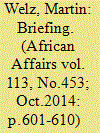

|
|
|
|
|
| Summary/Abstract |
ACADEMIC ANALYSES OF THE PROLONGED CRISIS in the Central African Republic (CAR) and the international response to it are rare. This masks the depth of the crisis. The most recent outbreak of conflict alone, following a coup d'état staged by the Séléka rebels in March 2013, left countless civilians dead,1 more than half a million people displaced, and over half of the 4.6 million population in immediate need of aid.2 Several regional and international organizations, including the African Union (AU), the Economic Community of Central African States (ECCAS), the European Union (EU), and the United Nations (UN), became involved in the process of crisis solution, with all of the organizations deploying troops to the CAR. Their efforts have thus far born limited results; fighting and human suffering continue.
|
|
|
|
|
|
|
|
|
|
|
|
|
|
|
|
| 2 |
ID:
110269
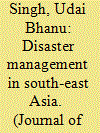

|
|
|
|
|
| Publication |
2012.
|
| Summary/Abstract |
South-east Asia is the epicentre of frequent disasters of varying intensity. The damage to life and property caused by these disasters is comparable to that caused by war. Disasters disrupt the national economy and social development. Besides, the world has shrunk and news about the hardship suffered by the people is rapidly disseminated. As such, the management of disasters has become a key concern of governments confronted with an increasingly aware civil society and a shorter reaction time. Often when disaster strikes, it impacts more than one country and sometimes the region as a whole. The intensity and the frequency of such disasters have prompted the ASEAN to evolve its own response mechanism. However, often the scale of the disaster is so huge that only an international response can meet the challenge. In such cases, the international community, acting through the United Nations and its various agencies and other inter-governmental and non-governmental bodies, has provided succour. Although disasters can be natural, technological and conflictrelated, this paper addresses only natural disasters in the region.
|
|
|
|
|
|
|
|
|
|
|
|
|
|
|
|
| 3 |
ID:
139367
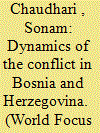

|
|
|
|
|
| Summary/Abstract |
Due to the changing nature of Conflict, establishment of internal security in post conflict societies is a major challenge for the international players. The Bosnian conflict has played a very important role in the international security scenario. It provided the chance to the international actors to show their peacekeeping and conflict management capacity in a war situation.
|
|
|
|
|
|
|
|
|
|
|
|
|
|
|
|
| 4 |
ID:
133597
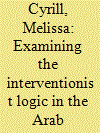

|
|
|
|
|
| Publication |
2014.
|
| Summary/Abstract |
At first glance, there was no coherent regional and international response to the transitions triggered in the Arab world since December 2010 as external players, both regional and international, had to confront with unceasing alarm the rapidity of change threatening to unravel in critical Arab states. However, as events in the region progressed, a pattern emerged to the external responses, one that was as predictive as it was differentiated. This was exemplified by the counter-revolutionary forces that were assembled against the transition in Bahrain on one hand, and the aggressively interventionist posture adopted towards Libya and Syria on the other. This inconsistency between activism and support for the supposedly democratic spirit of armed resistance groups, but inaction and silence towards the crushed non-violent public opposition elsewhere, clearly betrayed the interest-driven motivations of the external actors involved.
|
|
|
|
|
|
|
|
|
|
|
|
|
|
|
|
| 5 |
ID:
116852
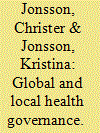

|
|
|
|
|
| Publication |
2012.
|
| Summary/Abstract |
From the outset in the mid-1980s the international response to hiv/aids has been characterised by an emphasis on the human rights aspects of the pandemic, and on recognition of the pivotal role of civil society actors (csos). But how the rights-based conception of hiv/aids and the international legitimation of csos play out at the local level depends not only on the vertical coordination between global and local levels but also on government-cso relations and the understanding of the pandemic in individual countries. South Africa and Cambodia provide comparative examples of 'glocalised' responses to hiv/aids. Both countries were among the hardest hit in their respective regions. But, while the South African government was slow to acknowledge the severity of epidemic, the Cambodian leadership quickly initiated a comprehensive response to it. The two cases illustrate how opportunity structures at the international and national levels created different local responses to hiv/aids, with significant consequences for the epidemic over time.
|
|
|
|
|
|
|
|
|
|
|
|
|
|
|
|
| 6 |
ID:
134022
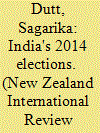

|
|
|
|
|
| Publication |
2014.
|
| Summary/Abstract |
The Indian general elections of 2014 to the 16th Lok Sabha (lower house of Parliament) were held between 7 April and 12 May. More than 500 million people cast their vote in these elections, and it is estimated that the turnout was the highest ever in the country's history. After a vigorous election campaign, the BJP, led by its idiosyncratic leader Narendra Modi, performed better than expected, winning the elections in a landslide and forming the new government. The international response to the BJP's triumph has been positive. The need to attract foreign direct investment was a key feature of the 2014-15 union budget presented by the new government in July.
|
|
|
|
|
|
|
|
|
|
|
|
|
|
|
|
| 7 |
ID:
059132
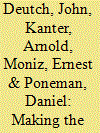

|
|
|
|
|
| Publication |
2004.
|
| Description |
p65-80
|
|
|
|
|
|
|
|
|
|
|
|
|
|
|
|
|
|
|
|
|